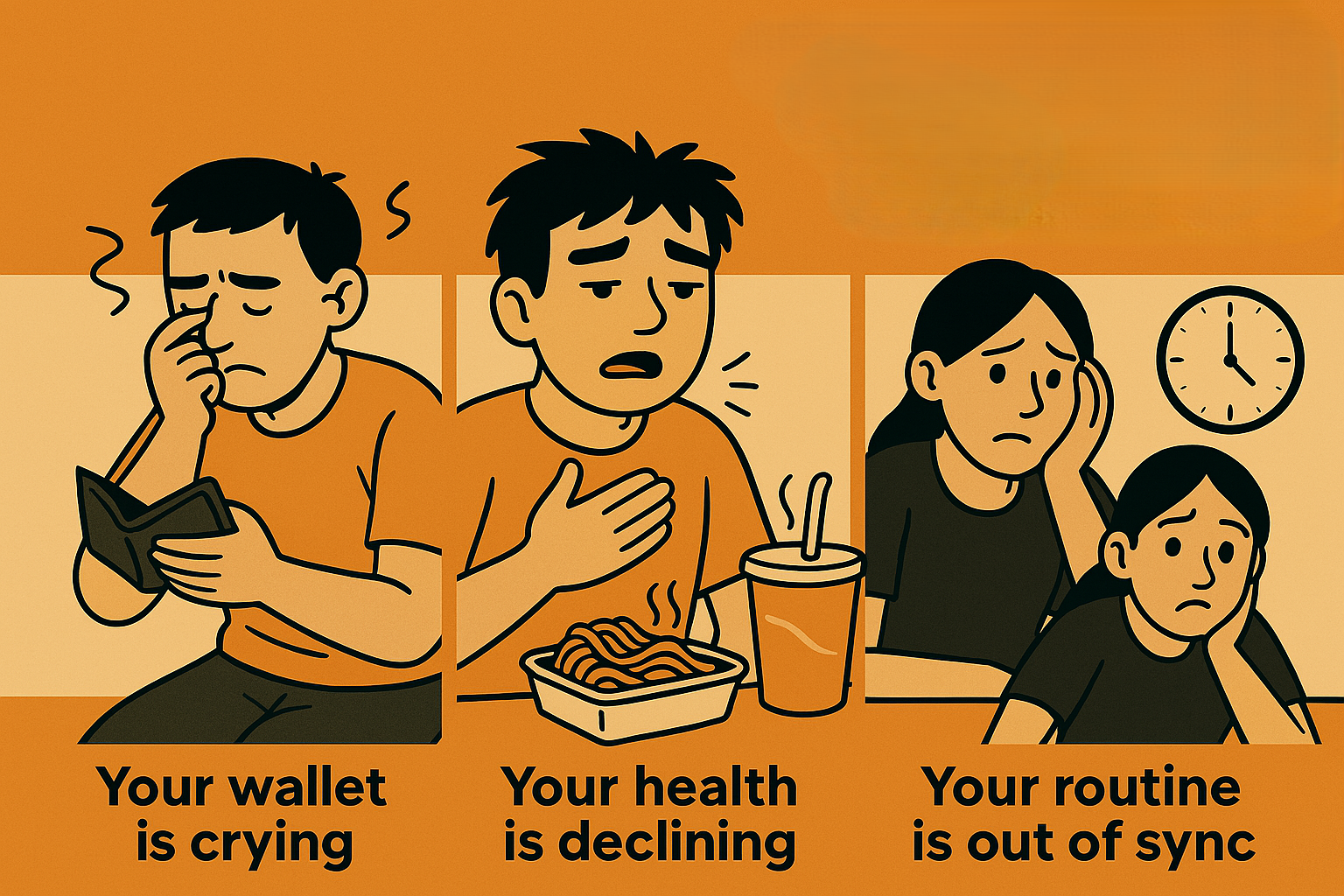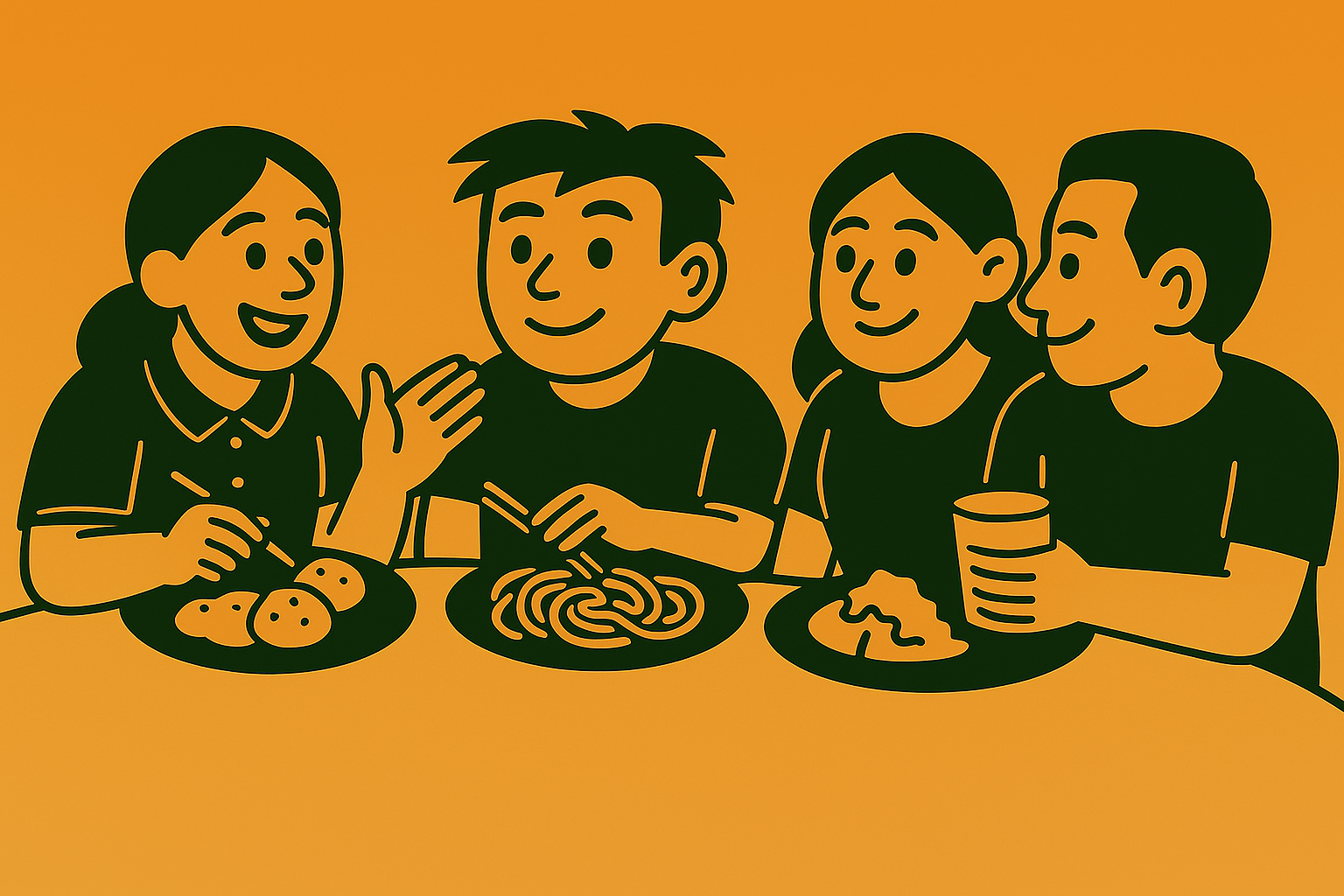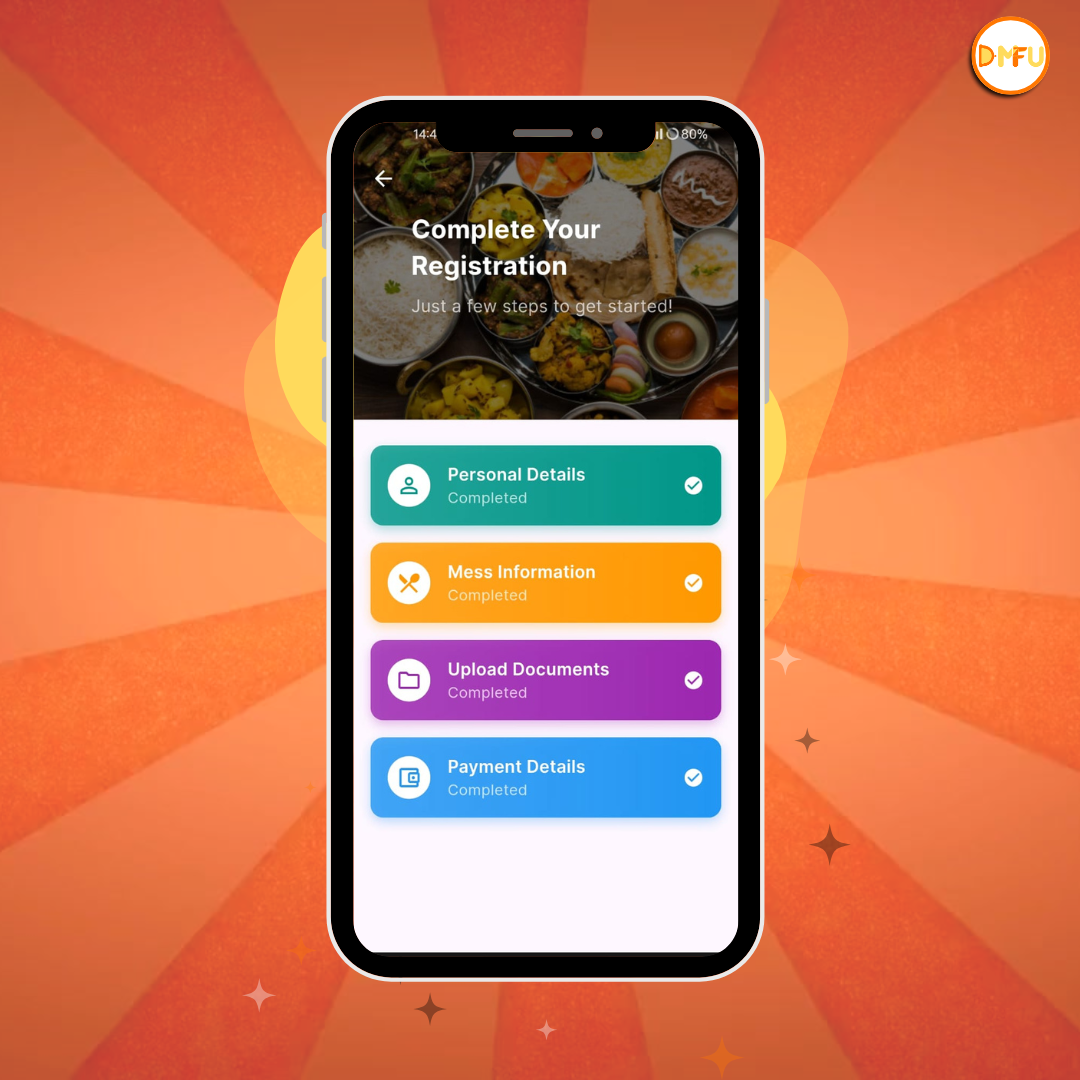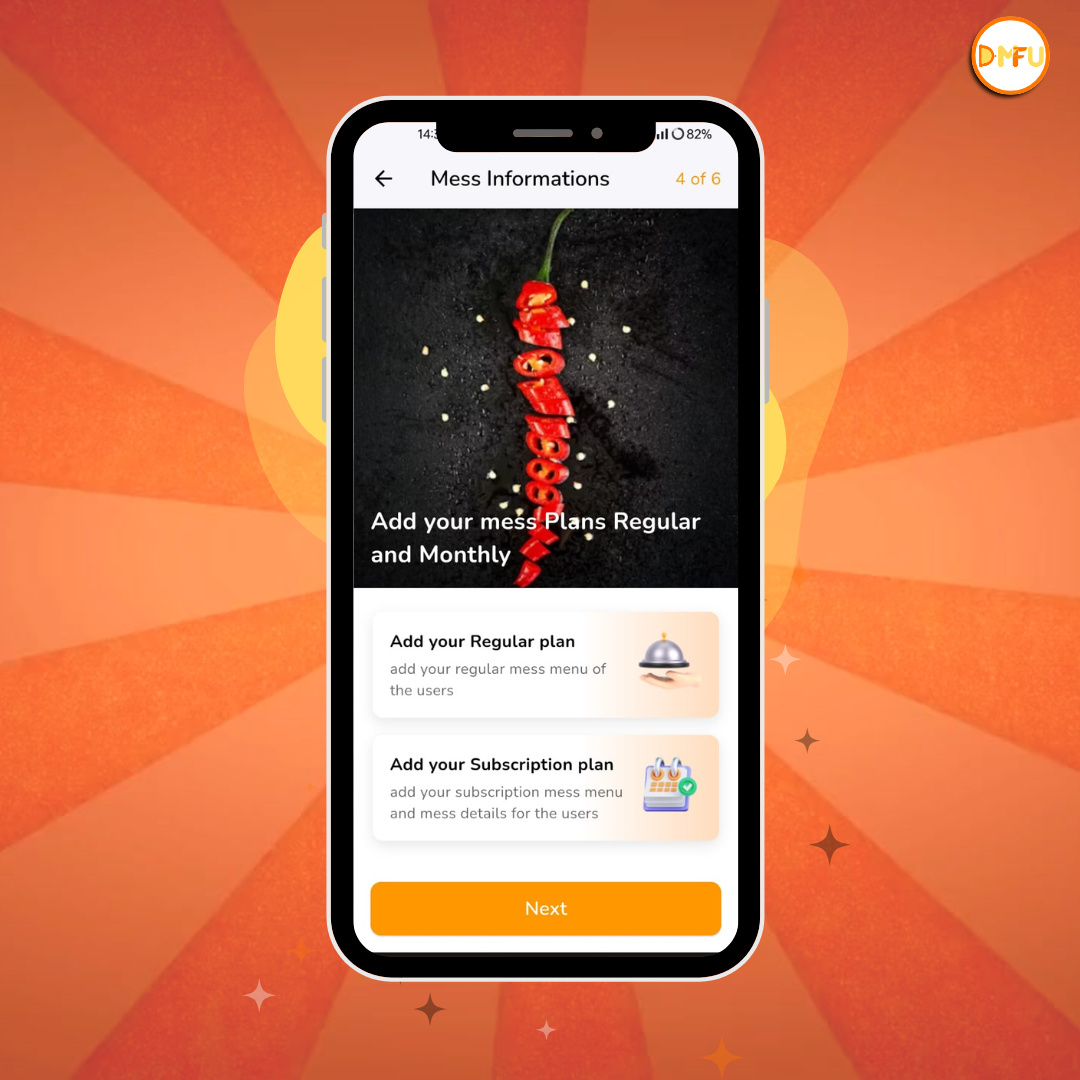The Everyday Food Struggle of Students
If you've ever lived away from home as a student, you know the drill. Waking up late, rushing to class, grabbing something quick (and probably unhealthy), and repeating that cycle with every meal. Between lectures, assignments, and trying to hold on to some kind of social life — planning proper meals often takes a backseat.
But here's the real issue: finding good, affordable food consistently is HARD. The average student spends between 30-40% of their monthly budget on food alone, making it one of the largest expenses after accommodation. And yet, despite this significant financial commitment, many students still struggle with maintaining a balanced diet.

The morning rush often means skipping breakfast altogether or grabbing something unhealthy on the go. Lunch becomes a hurried affair between classes, and dinner is whatever is easiest to prepare or order when exhaustion sets in. This cycle not only affects physical health but also impacts academic performance and overall well-being.
Food Delivery Is a Trap for the Budget-Conscious
Sure, food delivery platforms offer convenience. But try using them 3 times a day for a month — and you'll realize:
- Your wallet is crying - With delivery fees, service charges, and marked-up prices, the average meal costs 30-40% more than cooking at home.
- Your health is declining - Restaurant food typically contains more salt, sugar, and fat than home-cooked meals.
- Your routine is out of sync - Waiting for deliveries disrupts your schedule and productivity.

"I started tracking my food delivery expenses during my second semester. I was shocked to discover I had spent nearly ₹15,000 in just one month – almost half my entire semester budget for food."
Eating out or ordering in daily isn't sustainable. You need something that's both dependable and designed for your lifestyle. The temporary convenience of food delivery creates a long-term trap that many students fall into, only realizing the financial impact when it's too late.
The Art of Meal Planning on a Student Budget
Many students attempt to solve their food dilemma through meal planning and prep. While this approach works for some, it comes with its own set of challenges in a student environment:
Challenges
- Limited kitchen space in dorms and shared accommodations
- Lack of proper cooking equipment
- Time constraints between academic commitments
- Limited food storage options
- Cooking skills and knowledge gaps
Benefits
- Significant cost savings compared to eating out
- Better control over nutritional content
- Reduced food waste
- Development of essential life skills
- Consistent meal times improve study habits
For those who manage to overcome these obstacles, meal planning can be transformative. However, the reality is that most students lack either the time, space, equipment, or knowledge to make this a sustainable solution throughout their academic journey.
Mess Services: Underrated but Broken
Local mess services have always been the go-to for students:
Home-style meals
Nutritious food that reminds you of home cooking
Affordable monthly plans
Budget-friendly options that won't break the bank
No last-minute ordering
Consistent meal times you can plan around
But the problem? Discoverability, lack of transparency, and rigid processes. You often hear about a mess through word of mouth, visit it, negotiate prices, and hope the food is decent. There's little flexibility, no real feedback system, and payments are usually offline with no record.
The traditional mess system, while solving many problems, creates new ones through its outdated operational model. Students often find themselves locked into monthly contracts with services that may not consistently meet their expectations, with little recourse when quality drops.
The Health Impact of Poor Eating Habits
The consequences of inconsistent and unhealthy eating extend far beyond just hunger pangs. Research has shown that poor nutrition directly impacts cognitive function, memory retention, and concentration – all critical factors for academic success.
Common Health Issues Among Students Due to Poor Diet:
Fatigue and Low Energy
Affecting class attendance and study efficiency
Weakened Immune System
Leading to more sick days and missed classes
Poor Concentration
Directly impacting learning and retention
Mood Fluctuations
Affecting social interactions and mental health
A study conducted across multiple universities found that students with regular, nutritious meal patterns scored on average 12% higher on exams compared to those with irregular eating habits. The connection between good nutrition and academic performance is clear, yet often overlooked in the busy student lifestyle.
Enter DMFU: A Simpler Way to Eat Every Day
That's where DMFU comes in — a platform built by people who've faced this very problem, for students and working professionals who need a smarter way to manage their meals.
With DMFU, you can:
Find verified messes near you
Discover quality mess services in your area with ratings and reviews from other students
Subscribe to flexible meal plans
Choose daily or monthly plans with 1-time or 2-time meals that fit your schedule
Manage everything from one app
Mark attendance, skip meals, rate food, and manage payments all from your smartphone
No more WhatsApp messages. No awkward cash handovers. No last-minute food panic. Just a seamless food experience, backed by tech.

The DMFU Difference
- Pay via UPI or use coupons in your Mess Pocket (0% platform charges!)
- Get real-time updates if your mess changes menu or closes for a day
- Rate meals to help improve quality and hold messes accountable
- Discover new mess options as they join the platform
- Transparent pricing with no hidden fees
The Community Aspect of Shared Meals
Beyond just solving the practical problems of food, mess services offer something that delivery apps and cooking alone cannot: community. Eating together has been a fundamental human social activity for thousands of years, and this aspect is often overlooked in modern food solutions.

Benefits of Community Dining:
- Social Connections - Form friendships with peers from different courses and backgrounds
- Knowledge Sharing - Exchange study tips, course information, and campus insights
- Mental Health Support - Regular social interactions reduce feelings of isolation
- Networking Opportunities - Build connections that may benefit your future career
DMFU recognizes this important aspect and helps facilitate community building through its mess services. Many students report that the relationships formed over shared meals become some of their most valuable college connections.
Real Food. Real Convenience.
We know the student life. We've lived it. That's why DMFU doesn't just offer food — it offers control, clarity, and comfort. So next time you're wondering what to eat, don't scroll endlessly through delivery apps. Find a mess that fits your life. Try DMFU.
Ready to transform your daily meals?
Join DMFU today and change your meal schedule today
DMFU – Eat smart. Live better.






